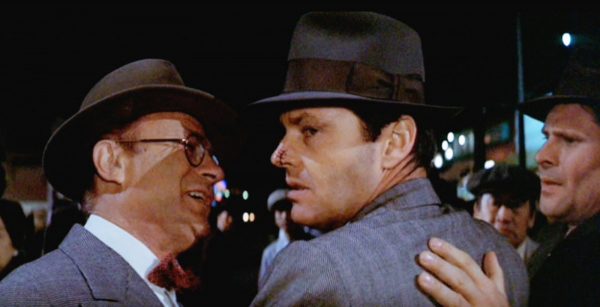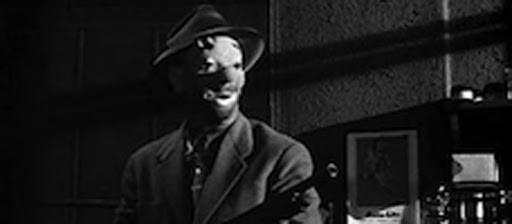Tom Jolliffe offers up ten essential noir films in celebration of Noirvember…
We’re into November, also known in some select cinephile circles as Noirvember. In celebration of the film noir genre as well as Neo-noir which evolved some of the classic staples in more contemporary styles, here is a selection of essential noir films. It’s a cold, bleak month, perfectly suited to celebrate a genre known for striking shadows, murderous plots, femme fatales and a blunt approach to criminality, life and death…
The Third Man

Carol Reed’s iconic and groundbreaking film noir has aged as well as anything from classic era Hollywood. Holly Martin (Joseph Cotton) is sent to investigate the death of an old friend, Harry Lyme. He uncovers a web of intrigue and corruption in Vienna before things take a further (and iconic) turn when Lyme (Orson Welles) turns up very much alive.
The film’s Viennese settings certainly lend itself to grand shadows, atmospheric dark alleys and caverns and Reed’s stylish visuals look utterly resplendent, giving the whole setting an off kilter and unsettling feel. Cinematographically it could be the blueprint for classic noir. It’s stunning, the plot is still enthralling, the finale unforgettable and Cotton, Welles and Alida Valli are magnificent.
Chinatown

Roman Polanski’s iconic neo-noir was a real throwback to the classic era film-noir staples. A murder mystery set in the 30’s, as a morally ambiguous P.I (and former Frisco Chinatown Detective), Jake Gittes takes on a simple spying job which descends into murder, intrigue, corruption and dark family secrets. This might be one of the finest screenplays ever committed to film (Robert Towne), whilst the performances from Jack Nicholson and Faye Dunaway particularly, are superb. It’s a stone cold classic.
The Maltese Falcon
This iconic film noir, based on an equally iconic source material (Dashiell Hammett’s book of the same name), is the epitome of what a film noir can be. The plot twists and turns, with a slew of dangerous and nefarious characters (among them, Peter Lorre). Our effortlessly cool Detective at the center of the danger is Sam Spade, played by the inimitable Humphrey Bogart. The book almost wrote the book on noir fiction. The movie did likewise for film-noir in the cinema.
Thief
Michael Mann became synonymous throughout his career for neo-noir classics, with Heat being particularly iconic. It all began with Thief, a moody, neon soaked, thriller about a safe cracker looking to make enough to retire in his dream life. James Caan as our titular thief was never better in a role that played to his tough guy strengths, whilst retaining an undercurrent of philosophical depth. The thief keeps a collage picture of his ‘dream’ life, to permanently remind him what he’s looking for, scooping up Tuesday Weld (she is also superb) into his ambitions along the way.
Thief is brilliantly written with razor sharp dialogue. Meanwhile the visuals drip style and the pulsating Tangerine Dream score brings the striking safecracking sequences to life. Mann had a minute attention to detail, often wanting an intense level of realism to how the cops and robbers in his films operated. We saw that in Heat, with the forensic sequences in Manhunter (which heavily inspired C.S.I) and it was started here with the array of tools Caan and his cohort Jim Belushi use to take down scores. Mann wonderfully captured the rugged determination and sweat required to crack a safe.
SEE ALSO: James Caan’s Finest Hour: Thief
Memento

It’s still Christoper Nolan’s masterwork. Memento is a brilliantly clever murder mystery which begins with the murder and plays out in reverse, as we find out how Leonard Shelby came to find the murderer of his wife. The big gimmick in the film is that Shelby has no short term memory, meaning his entire investigation has rested on leaving himself notes, or for very important details, tattooing himself. The more we see of his investigation the more we see how easily he can be manipulated, or indeed fooled by even himself. Additionally, for a director occasionally accused of distant and cold characterisations, Memento remains one of Nolan’s most emotionally engaging works.
Basic Instinct
It might have become more infamous for a leg crossing scene and almost explicit sex scenes than anything else, but beneath those atypically brash moments from shlockmeister Paul Verhoeven, we also see the other side of his film-making genius. Basic Instinct at heart is a classic neo-noir femme fatale story. Sharon Stone as Catherine Trammell is superb. She’s sultry, sexy, intense and exudes a black widow-danger as she’s lures men into dangerous and potentially murderous scenarios.
Michael Douglas plays a Detective investigating a murder, with eyes on her, but she’s clever and evasive. She begins to suck him into her web and he falls right into the trap, one beaver glimpse at a time. The film is more clever than it’s given credit for, as per usual for much of Verhoeven’s work. The lascivious blind spot of the male species, so easily manipulated, wryly dissected (and punished) here. The cinematography and Jerry Goldsmith’s score are wonderfully evocative of classic period noir.
The Killing

Stanley Kubrick’s breakout and somewhat groundbreaking thriller, would become a huge inspiration for Quentin Tarantino’s Reservoir Dogs. The racetrack heist is played out with the chronology fractured as we learn more about how things went awry. Kubrick’s mastery of craftsmanship, even whilst so young, is fully evident here. It’s a classic noir, coming at the end of the genre’s initial period. What’s more, it’s so overshadowed by Kubrick’s forthcoming litany of classics, that The Killing is often overlooked.
Detour

A Hitch-hiker takes on the identity of a dead man. A moment of opportunistic folly. He then finds himself blackmailed by an unscrupulous femme fatale. It’s a very lithe, but briskly paced noir, stylistically ahead of its time. This also plays with chronology as our protagonist, a jazz pianist, recounts his ‘detour.’ This low budget B picture has since become a genre defining example. It looks superb, belying it’s tiny budget and is crammed with striking shadows a masses of noir atmosphere.
Vertigo
It would be remiss not to include a film from one of the masters of cinema, Vertigo. A complex and weaving plot laid so much groundwork for the narratively complex evolution in many neo-noir and crime thrillers. A former detective suffering from a crippling fear of heights (following an incident on the job) is asked to perform a simple job and follow the wife of a friend, who has been prone to strange diversions during the day. She’s seemingly obsessed with a woman long dead (who has a tragic back story).
John (Jimmy Stewart) becomes enamoured with the wife (Kim Novak), having to engage directly when she throws herself into a river. The begin to bond. He ends up witnessing her death, unable to follow her to the top of a building (due to said fear of heights). Then the film twists into a tail of psychological breakdown and obsession as he encounters a woman bearing a striking similarity to the recently deceased. Then more twists…Vertigo, for good reason, has often been counted among the all time greats in cinema.
Minority Report

Let’s chuck in some sci-fi. Steven Spielberg’s murder tale is of particular interest. It has some very noir-esque visuals and an array of dark, shady characters, among plenty of double crossing. The interesting part lies in the notion of pre-crime, where the tech of the film allows for a criminal to be tried and convicted for murder, before they’ve even committed it. This opens an array of philosophical questions about fate and destiny versus choice.
Tom Cruise is excellent, and the film never becomes just another star vehicle. He gives a great performance and the action is still superb. In the 20 years since its release, it’s become a little forgotten and overlooked (quite unfairly). Minority Report remains one of the finest sci-fi films of the century. It may well be the last great blockbuster Spielberg did, particularly given he seems to put his best work into more high brow/intellectual pictures (over things like Ready Player One as an example). Minority Report treads blockbuster and intellectual very well though.
SEE ALSO: Noirvember: The Straight-to-Video Selection
What are your favourite noir films (classic or neo)? Let us know on our social channels @FlickeringMyth or reach out to me on Instagram here…





